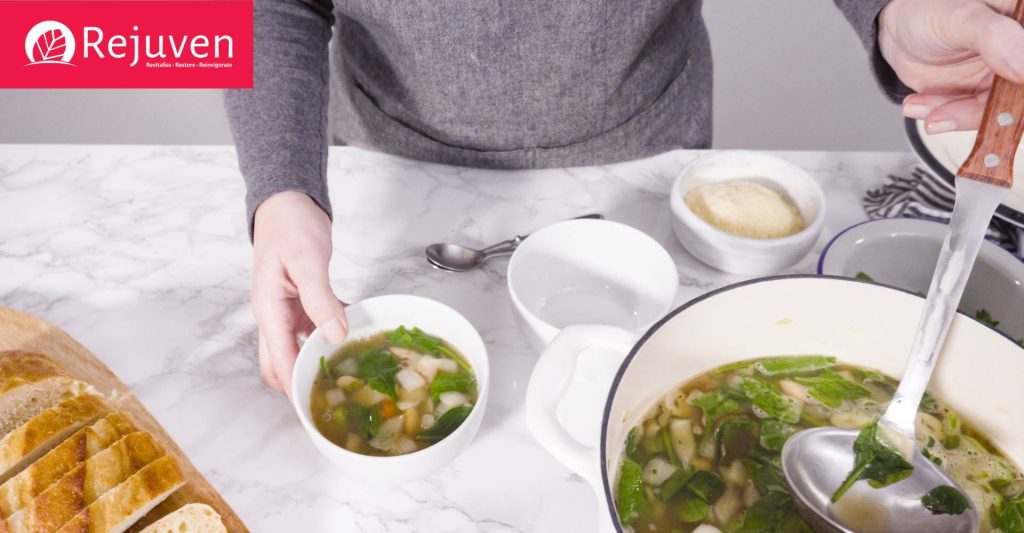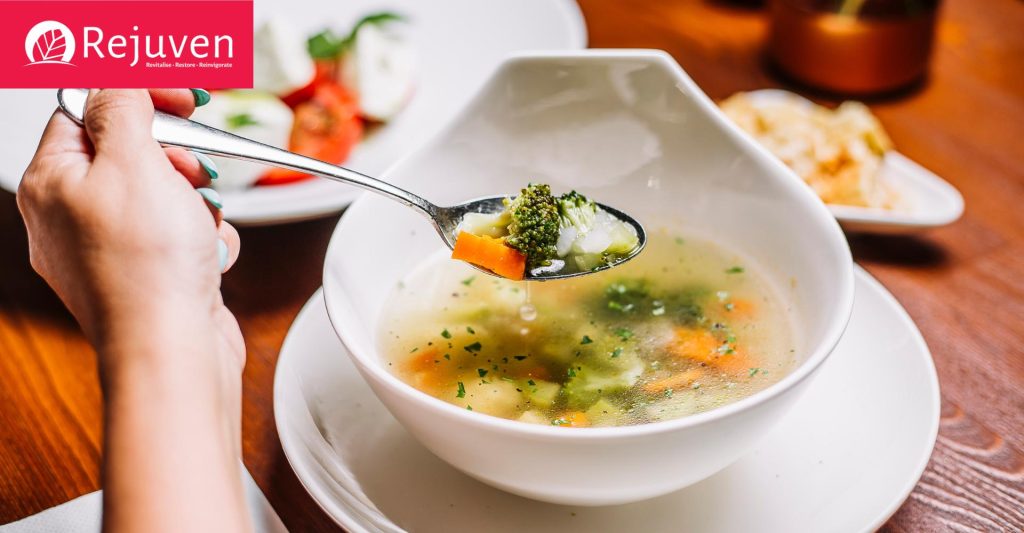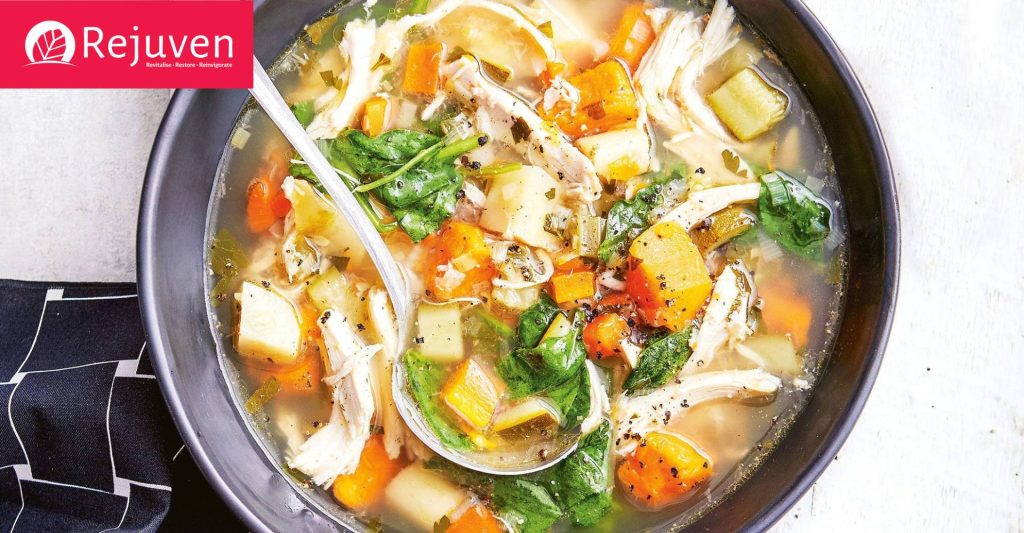
Healing Elixirs: Nourishing Soups for Post-Surgery Recovery
Introduction
Welcome, dear readers, to a journey of rejuvenation and healing through the time-honoured wisdom of Traditional Chinese Medicine (TCM). As an experienced TCM meal practitioner and dietician, I am excited to share with you the secrets of nourishing soups specifically designed for post-surgery recovery in men and women over 50.
When we reach the golden age of 50 and beyond, our bodies may need a little extra TCM to bounce back from surgery. Nutrition plays a pivotal role in this process, aiding in wound healing, bolstering the immune system, and reducing the risk of complications. In this article, we’ll delve into the world of TCM and its remarkable healing soups, crafted to nourish both body and soul during the post-surgery journey.
Section 1: The Importance of Nourishing Soups for Post-Surgery Recovery & Nutrition
Recovering from surgery can be challenging, especially as we age. But fret not, as proper nutrition can make a world of difference. Imagine your body as a finely tuned instrument, and nutrition as the melodious notes that help it sing a song of recovery.
Post-surgery, your body is in overdrive, repairing tissues and fending off potential infections. For individuals over 50, this process can be slower and more complex. Nutrient-rich foods become essential to support these efforts. Consider it the ultimate act of self-care.
Section 2: Traditional Chinese Medicine (TCM) and Healing Soups
Let’s now move on to the heart of our discussion: Traditional Chinese Medicine (TCM) . For thousands of years, Traditional Chinese Medicine (TCM) practices have been improving health and well-being by using a holistic approach that considers the mind, body, and spirit. TCM practices include not only medical practices, but also TCM-based meals.
In TCM, food is medicine, and soups are particularly valued as healing elixirs. They are not just sustenance; they are a way to nourish both your body and soul. Imagine savouring a warm, comforting bowl of chicken noodle soup, its rich aroma filling your senses. The first spoonful is like a gentle embrace, soothing your soul and encouraging your body to heal.
For your info, soup is an excellent way to obtain the nutrients your body needs to fight off illness and promote healing. It is also a great way to stay hydrated, which is essential when you are sick. Soups are known to be easy to digest, which can be beneficial if you have an upset stomach.
There are many different types of soup that can be used for healing in TCM. Some of the most popular include:
- Chicken soup: Chicken soup is a classic comfort food that is also good for you. It is said to help boost the immune system and fight off infection.
- Vegetable soup: Vegetable soup is a great way to get a variety of nutrients, including vitamins, minerals, and antioxidants. It is also low in calories and fat.
- Miso soup: Miso soup is a Japanese soup made from miso paste, dashi broth, and other ingredients. It is said to help improve digestion and boost the immune system.
- Bone broth: Bone broth is made by simmering bones and connective tissue in water for a long period of time. It is rich in nutrients, including collagen, gelatine, and minerals. It is said to help improve gut health and joint health.

Section 3: Planning to Cook it at Home? Continue Reading
A Symphony of Ingredients by Choosing the Right Ingredients
To create these nourishing soups, you’ll need an ensemble of quality ingredients. Just like a skilled conductor orchestrates a symphony, we’ll bring together elements that harmonize for your recovery.
In TCM, certain ingredients are celebrated for their therapeutic properties. Take, for example, astragalus root, renowned for its immune-boosting qualities. And why was that? Well, it’s like having an army of tiny soldiers guarding your health.
Prioritise Vegetables – Your Main Nutrient Powerhouses
Veggies like dark leafy greens, carrots, and mushrooms are star players in our soup recipes. These colourful treasures offer vitamins, minerals, and antioxidants that aid in healing. Spinach, for instance, provides a hefty dose of vitamin K, crucial for blood clotting and bone health.
Don’t Neglect Proteins – The Rebuilding Blocks of Your Muscle and Tissues
Proteins are the building blocks of your body. They are essential for the growth, repair, and maintenance of your tissues. Proteins are also involved in many other important bodily functions, such as the production of hormones and enzymes.
Lean chicken and tofu are good sources of protein. They are also low in fat and calories. Other good sources of protein include fish, beans, lentils, nuts, and seeds.
When you eat protein, your body breaks it down into amino acids. These amino acids are then used to build new proteins or to repair damaged proteins. Proteins are constantly being broken down and rebuilt in your body. This process is essential for maintaining your health.
Imagine proteins as the architects and laborers of your body. They are responsible for building and repairing your tissues. Without proteins, your body would not be able to function properly.
Add the TCM Magic Ingredients – The Healing Herbs and Spices
TCM menu loves to spice things up, quite literally. Ginger and turmeric are potent spices often used for their anti-inflammatory and pain-relieving properties. Just a pinch can infuse your soup with healing magic.
Section 4: Your First TCM-Based Soup Nourishing Soup Recipes
Recipe 1: Basic Healing Broth
Ingredients:
- 1 whole organic chicken (or chicken parts)
- 2 large carrots, chopped
- 2 stalks celery, chopped
- 1 onion, peeled and quartered
- 4 slices ginger
- 2 cloves garlic, crushed
- Water
Instructions:
- Place all ingredients in a large pot.
- Cover with water and bring to a boil.
- Reduce heat and simmer for 2-3 hours.
- Strain, and your healing broth is ready!
This basic broth serves as the foundation for our nourishing soups. The chicken provides essential proteins, while the veggies and ginger offer a symphony of nutrients and flavour.
Recipe 2: Immune-Boosting Mushroom Medley
Ingredients:
- 1 cup sliced shiitake mushrooms
- 1 cup sliced oyster mushrooms
- 4 cups chicken or vegetable broth (from the basic healing broth)
- 1 tsp grated ginger
- 2 cloves garlic, minced
- 2 green onions, chopped
- Salt and pepper to taste
Instructions:
- In a pot, sauté ginger, garlic, and mushrooms until tender.
- Add the chicken or vegetable broth and simmer for 10 minutes.
- Season with salt and pepper and garnish with green onions.
This savoury soup not only pleases the taste buds but also strengthens your immune system with the power of mushrooms and ginger.
Recipe 3: Bone-Healing Spinach Soup
Ingredients:
- 4 cups chicken or vegetable broth (from the basic healing broth)
- 2 cups fresh spinach leaves
- 1 cup diced cooked chicken (from the basic healing broth)
- 1 cup cooked brown rice
- Salt and pepper to taste
Instructions:
- In a pot, bring the broth to a simmer.
- Add spinach, chicken, and brown rice.
- Cook until the spinach wilts.
- Season with salt and pepper.
This soup provides calcium and vitamin K, supporting bone health while embracing your palate with warmth.

Section 5: Preparing and Storing Healing Soups
Crafting Soups with Love
When preparing your healing soups, be mindful and careful. The process of cooking becomes a therapeutic act in itself, infusing your creations with positivity and healing intention.
Here are some other ways to say the same thing:
- Cook your healing soups with intention and care.
- The act of cooking can be therapeutic, infusing your creations with positivity and healing intention.
- When you cook your healing soups, take the time to savor the process and infuse your creations with positive energy.
Storing for Later
Life can get busy, so it’s wise to prepare your soups in batches and freeze them in single-serving portions. This will make it easy to have a healthy and convenient meal on hand when you’re feeling under the weather. Just like a cozy blanket, a warm bowl of soup can be the perfect comfort food when you’re feeling sick.
It can also help to replenish your fluids and nutrients, which can be important when you’re not feeling well. So next time you’re feeling under the weather, reach for a bowl of soup instead of a snack or fast food. It may just be the thing you need to feel better.
Section 6: Incorporating Healing Soups into the Post-Surgery Diet
Frequency and Quantity
How frequently should you consume these nourishing elixirs? Well, it depends on your individual needs and the specific elixirs you are using. However, a good general rule of thumb is to aim for at least one bowl per day during your recovery period. This will help to ensure that you are getting a regular dose of the nutrients and healing properties that the elixirs offer.
If you are recovering from a serious illness or injury, you may want to consume more than one bowl per day. You can also increase your intake if you are feeling particularly stressed or depleted.
While consuming nourishing elixirs is not difficult, it is essential to listen to your body and pay attention to how you are feeling. If you find that you are feeling more energised and balanced after consuming the elixirs, then keep up your routine. But if you experience any negative side effects, such as upset stomach or diarrhoea, reduce your intake or stop consuming the elixirs altogether.
Complementary Choices
Soups are a great way to get your daily dose of vegetables, but they shouldn’t be the only thing you eat. To create a well-rounded diet, you should also include fruits, whole grains, and lean proteins in your meals.
Think of it as crafting a harmonious melody of nutrition. Each type of food plays an important role in keeping your body healthy and functioning properly. Fruits are known to provide essential vitamins and minerals, whole grains give you energy, and lean proteins help build and repair tissues.
When you eat a variety of these foods, you’re giving your body everything it needs to stay strong and healthy. So don’t forget about the other players in your dietary symphony! Incorporate fruits, whole grains, and lean proteins into your meals to create a well-rounded diet that will keep you feeling your best.
Seek Professional Guidance
Before making major dietary changes, it is essential to consult with a healthcare professional. They can help you determine if the changes are safe for you, ensure you are getting all the nutrients you need, and monitor your progress.
Here are some specific examples of how a healthcare provider or TCM practitioner can help you with dietary changes:
A registered dietitian can help you:
- Set realistic goals and develop a safe and effective weight loss plan.
- Develop a diet that is low in processed foods and high in fiber.
- Develop a diet that is low in sodium and high in potassium.
- Develop a diet that is low in saturated and trans fats.
- Develop a diet that is high in calcium and vitamin D.
- Develop a diet that meets the nutritional needs of yourself and your baby.
TCM practitioners can also provide additional guidance on dietary changes based on your individual constitution and energy imbalances. For example, if you have a yin deficiency, they may recommend eating more warming and nourishing foods. If you have a yang deficiency, they may recommend eating more cooling and refreshing foods.
Overall, consulting with a healthcare provider or TCM practitioner before making significant dietary changes is a wise decision. They can help you make sure that you are making changes that are safe and effective for you.

Section 7: Potential Benefits and Considerations
The Road to Recovery
By including healing soups into your post-surgery diet, you can pave the way to a smoother, faster, and more complete recovery.
Here are just a few of the many benefits you can expect:
- Improved wound healing: Healing soups are typically packed with nutrients that are essential for tissue repair, such as protein, vitamin C, and zinc. For example, chicken soup is a good source of all three of these nutrients.
- Strengthened immunity: Surgery can take a toll on your immune system, leaving you more susceptible to infection. Healing soups can help to boost your immune system and reduce your risk of getting sick. For example, mushroom soup is a good source of antioxidants, which can help to fight off infection.
- Reduced risk of complications: Healing soups can also help to reduce your risk of developing complications after surgery, such as constipation and dehydration. For example, lentil soup is a good source of fiber, which can help to keep your digestive system healthy.
- Improved appetite: Healing soups can also help to improve your appetite, which is important for getting the nutrients you need to recover. For example, chicken noodle soup is a classic comfort food that many people find appealing.
Additionally, healing soups are also a great way to stay hydrated and nourished after surgery. They are typically easy to digest and can be eaten in smaller portions, which can be helpful if you are feeling nauseous or have a limited appetite.
Section 8: Consider Using TCM-Based Meals Caterer Service
Try TCM-Based Meal from Rejuven by RichFood
Here are some reasons why you need to subscribe to Rejuven By RichFood Post Surgery Meal:
- Convenience: Rejuven By RichFood Post Surgery Meal is a convenient and hassle-free way to ensure that you are getting the nutrients you need to recover from your surgery. The meals are delivered to your door, so you don’t have to worry about planning, cooking, or shopping for food.
- Nutrition: Rejuven By RichFood Post Surgery Meal is designed to provide you with the essential nutrients you need to heal and recover. The meals are high in protein, vitamins, and minerals, and they are also low in fat and calories.
- Safety: Rejuven By RichFood Post Surgery Meal is prepared by experienced chefs in a state-of-the-art kitchen. The meals are also packaged in a way that ensures freshness and safety.
- Variety: Rejuven By RichFood Post Surgery Meal offers a variety of meals to choose from, so you can find something to your taste. You can also choose from different meal plans to fit your individual dietary needs.
- Peace of mind: Knowing that you have access to healthy and nutritious meals can give you peace of mind during your recovery. You can focus on healing and getting stronger, without having to worry about your food.
Note: Our trial Post-Surgery Meals starts from $42.00 and comes with 1 herbal tonic soup, 1 serving of meat dish, 1 serving of vegetable, 1 serving of rice and 2 complimentary serving of daily tea which is not replaceable and exchangeable. Visit our product page to learn more.
Tread Carefully
As with any dietary changes, there are considerations. Some ingredients may interact with medications or allergies, so always proceed with caution. It’s best to consult with a healthcare professional for guidance tailored to your unique circumstances.
Conclusion
To conclude, nourishing soups inspired by Traditional Chinese Medicine offer a comforting and effective path to post-surgery recovery for men and women over 50. These soups, filled with carefully chosen ingredients, provide not only physical healing but also emotional and mental solace during your journey.
Remember, dear readers, the road to recovery is paved with delicious intentions and nourishing soups. Embrace this healing tradition, and let the warmth of each bowl guide you back to health. It’s time to sip, savour, and heal, one spoonful at a time.
Frequently Asked Questions
Healing soups can help to:
- Boost the immune system
- Fight off infection
- Promote wound healing
- Reduce inflammation
- Improve gut health
- Provide essential nutrients
- Keep you hydrated
Some of the best ingredients to use in healing soups include:
- Vegetables: dark leafy greens, carrots, mushrooms, tomatoes, onions, garlic, ginger
- Lean protein: chicken, fish, tofu, beans, lentils
- Herbs and spices: ginger, turmeric, garlic, black pepper, astragalus root
- Bone broth
A good general rule of thumb is to aim for at least one bowl of healing soup per day during your recovery period. However, you may want to consume more than this if you are recovering from a serious illness or injury, or if you are feeling particularly stressed or depleted.
Here are some tips for incorporating healing soups into your post-surgery diet:
- Make a big batch of soup and freeze it in single-serving portions. This will make it easy to have a healthy and convenient meal on hand when you’re feeling under the weather.
- Add soup to your regular meals. For example, you could have a bowl of soup for lunch or dinner, or you could add a cup of soup to your morning omelet.
- Get creative with your recipes. There are many different ways to make healing soups. Try experimenting with different ingredients and flavors to find what you like best.